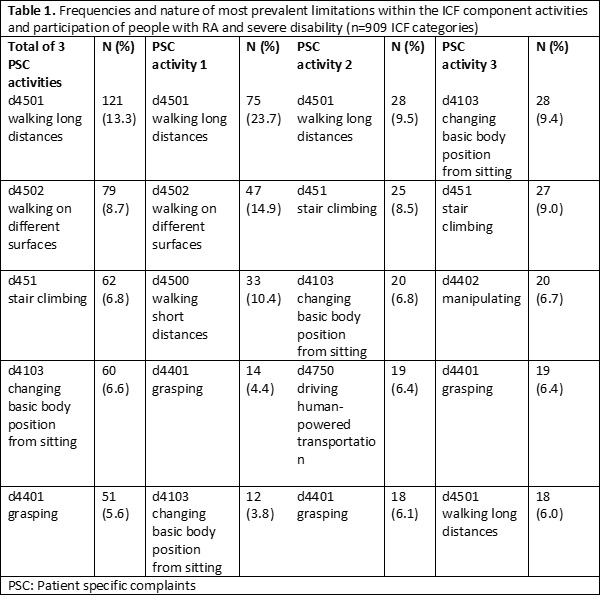Session Information
Date: Monday, November 13, 2023
Title: (1264–1307) RA – Diagnosis, Manifestations, and Outcomes Poster II
Session Type: Poster Session B
Session Time: 9:00AM-11:00AM
Background/Purpose: There is a lack of knowledge about the limitations in activities and participation experienced by a subgroup of people with rheumatoid arthritis (RA) and severe functional disability, such as those with difficult-to-treat RA. More insight is essential to optimize their treatment, in particular non-pharmacological care, of which exercise therapy is an essential element. The International Classification of Functioning, Disability and Health (ICF) offers a common framework to classify functional limitations. Therefore, the aim of the study was to describe limitations in activities and participation of people with RA with severe functional disability using the ICF as a reference.
Methods: Baseline data from n=206 people with RA and severe disability, participating in an exercise trial were used. In that trial, the Patient Specific Complaint (PSC) was used as an instrument to identify and quantify limitations in activities and participation. For each participant, the three most limited activities as derived from the PSC were linked to the ICF. Two researchers independently identified meaningful concepts within each PSC activity and linked them to the most specific ICF category within the “Activities and Participation” component, following standardized linking rules. The frequencies of ICF categories were calculated and compared with activities and participation elements of the Comprehensive and Brief ICF Core Sets for RA.
Results: Of 206 RA patients (90.8% female, 58.7 (12.9) years of age, 1.5 (0.5) HAQ-DI score), 618 PSC activities were linked to 909 (72 unique) ICF categories. Taking into account all three activities, the five most prevalent ICF categories concerned the ICF domain Mobility (d4) and included d4501 walking long distances (n=121/909; 13.3%); d4502 walking on different surfaces (n=79/909; 8.7%); d451 stair climbing (n=62/909; 6.8%); d4103 changing basic body position from sitting (n=60/909; 6.6%); and d4401 grasping (n=51/909, 5.6%) (Table 1). Considering the top-5 of the three individual PSC activities, three additional ICF categories (driving human-powered transportation, manipulating, walking short distances) were found to be relatively frequent. All of the most frequent ICF categories were included in the ICF RA Core Sets, except for stair climbing.
Conclusion: Most limitations of patients with RA with severe disability were seen in the ICF domain Mobility. Except for stair climbing, most of the identified ICF categories were covered by the related sections of the ICF RA Core sets. Clinicians should thus be aware that some relatively common problems in selected groups of RA patients may not be included in the Core Sets.
To cite this abstract in AMA style:
Teuwen M, van Weely S, Vliet Vlieland T, Douw T, van Wissen M, den Broeder A, van Schaardenburg D, van den Ende C, gademan M. What Is the Nature of Functional Problems in People with Rheumatoid Arthritis and Severe Disability; An Analysis Using the International Classification of Functioning, Disability and Health as a Reference [abstract]. Arthritis Rheumatol. 2023; 75 (suppl 9). https://acrabstracts.org/abstract/what-is-the-nature-of-functional-problems-in-people-with-rheumatoid-arthritis-and-severe-disability-an-analysis-using-the-international-classification-of-functioning-disability-and-health-as-a-refer/. Accessed .« Back to ACR Convergence 2023
ACR Meeting Abstracts - https://acrabstracts.org/abstract/what-is-the-nature-of-functional-problems-in-people-with-rheumatoid-arthritis-and-severe-disability-an-analysis-using-the-international-classification-of-functioning-disability-and-health-as-a-refer/


